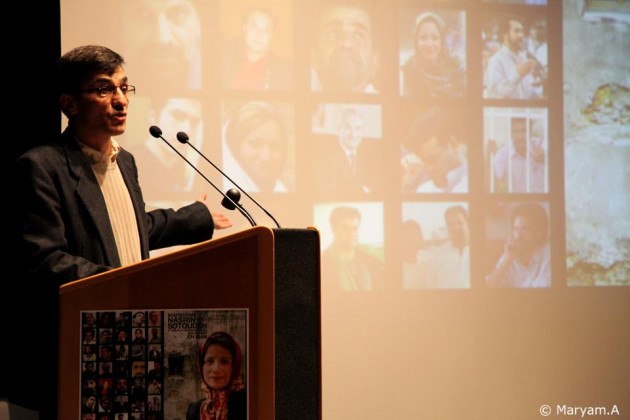Demanding Justice, an Interview with Reza Moini
 In an interview with Kambiz Hosseini, host of the International Campaign for Human Rights in Iran’s “Five in the Afternoon” weekly podcast, Reza Moini, the head of Reporters Without Borders’ Iran, Afghanistan, and Tajikistan desk, said that his brother lost his life during the 1988 mass executions of dissidents in Iranian prisons. “My mother passed away two months ago. She struggled for 25 years for the right to mourn in the Khavaran [cemetery]; for the right to know, for the right to know where her son’s grave was. This is very, very, intriguing that a family suffers a loss like this and for the mother not to know [what has happened]. The old woman spent 45 years of her life [wandering] in prisons and cemeteries, from the time of the Shah to Khomeini, and in the end she did not know where her son was buried or why he was killed.”
In an interview with Kambiz Hosseini, host of the International Campaign for Human Rights in Iran’s “Five in the Afternoon” weekly podcast, Reza Moini, the head of Reporters Without Borders’ Iran, Afghanistan, and Tajikistan desk, said that his brother lost his life during the 1988 mass executions of dissidents in Iranian prisons. “My mother passed away two months ago. She struggled for 25 years for the right to mourn in the Khavaran [cemetery]; for the right to know, for the right to know where her son’s grave was. This is very, very, intriguing that a family suffers a loss like this and for the mother not to know [what has happened]. The old woman spent 45 years of her life [wandering] in prisons and cemeteries, from the time of the Shah to Khomeini, and in the end she did not know where her son was buried or why he was killed.”
Reza Moini has intimate knowledge of political persecution and executions in Iran. In addition to working every day for reporters, bloggers, and other individuals whose rights have been violated due to restrictions put on freedom of expression, Moini lost thirteen members of his family after the 1979 Islamic Revolution in Iran. This interview was conducted on the twenty-fifth anniversary of the mass political executions in the summer of 1988. Moini spoke in detail about the executions in the 1980s, pursuing the killings in international courts, Ayatollah Montazeri’s memoirs in which he refers to the mass executions, the appointment of Mostafa Pour-Mohammadi as the Rouhani cabinet’s Minister of Justice, and the ongoing harassment of the families of executed dissidents.
“In my opinion one of the main efforts of the Khavaran Mothers, which will last through the Iranian history as a major development, is their effort to demand justice—and not to seek revenge. The phrase ‘demand justice’ that I speak of is expressed by the families in the following ways: ‘[We wish for] something like this to never happen again in Iran’; ‘Families should never again suffer like this’; and ‘Never let this happen again.’ But, this is not possible without people’s awareness and a public tribunal. For this reason, I support the national plea for justice, because this issue must be transformed into a public and national debate and people must know what has happened to us, so that they will be able to prevent it from happening again in the future. This won’t be possible without an informed viewpoint,” Moini said about the families’ and the human rights community’s demand to pursue the issue of the 1988 executions, 25 years later.
Political satirist Kambiz Hosseini frequently interviews people of note and people who are active in the field of human rights on his weekly podcast, “Five in the Afternoon,” produced by the International Campaign for Human Rights in Iran. This interview can be heard in Persian on the 30th episode of the podcast.






